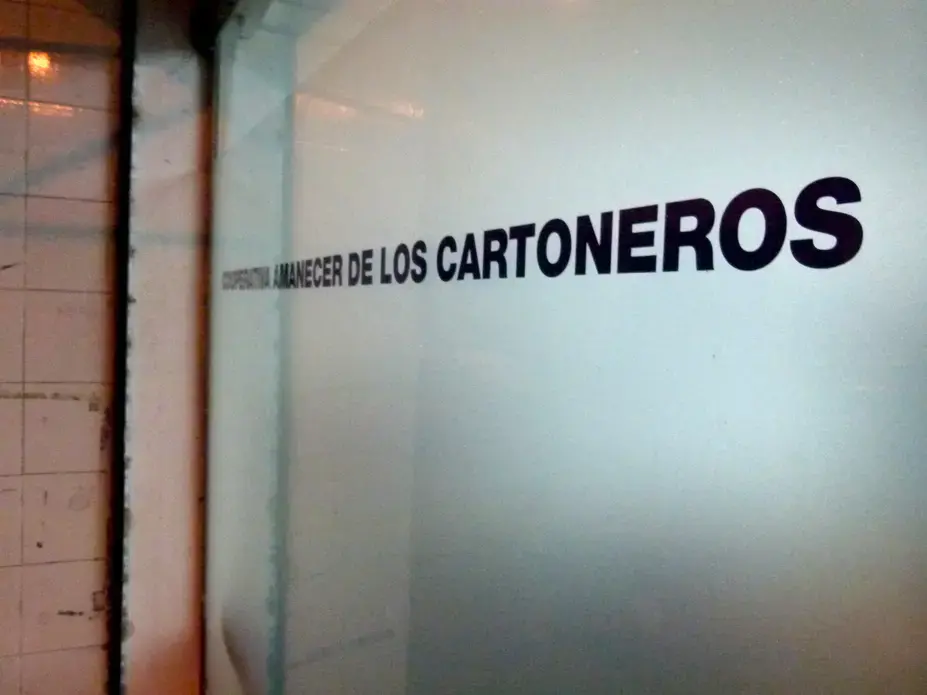The heavy wrinkles that frame his warm brown eyes and his crooked smile make him seem much older than his 45 years. His name is Raul Bernardo Villordo, but everyone calls him Tati and he is a cartonero in Buenos Aires, a trash picker whose livelihood depends on the mountains of rubbish generated each day by residents of Argentina's capital city.
Tati sits under harsh fluorescent lights in the tiny one room office of "El Movimiento de Trabajadores Excluidos" (The Movement of Excluded Workers), a cooperative of cartoneros in which Tati is an active member. Cooperatives are self-organized groups that act like a union. They are still fighting for full recognition from the government of Buenos Aires. While he spoke, volunteers prepared a giant pot of stew in the communal kitchen.
"Its not just that we are cartoneros, but also we are human beings and we have rights," Tati said, pausing for a moment. "We have rights."
Tati's story is typical of many cartoneros. After the financial crisis that hit Argentina in 2001, Tati lost his job. One of the only ways to support his family was to come into the city every night and work as a cartonero.
"And like that we started. One started, then two, then three. We were growing," Tati said, his soft voice nearly masked by the sounds of knives chopping onions and potatoes.
At first there were many problems, from the corrupt police who would make them pay for each cart used to haul their precious cardboard, to the violent fights between cartoneros and government employees.
"Because of all this we started uniting, coming together, and when one had a problem, we acted to help him," he said.
From there came cooperatives like MTE, the largest and one of the only fully functioning cooperatives of cartoneros in Buenos Aires, with some 2,500 members out of the estimated 8,000 cartoneros in the city. MTE is now run by a mixture of elected cartoneros and a group of volunteers who help arrange and provide uniforms and equipment, childcare, healthcare, representation and other services.
In the last few years, the cooperatives have helped advance the position of the cartoneros from that of an underground and informal workforce to a recognized group. Tati explained that one of the biggest changes came when the members of MTE received uniforms. Neighbors started separating the trash for the cartoneros, even inviting them into their houses for some tea or soup.
"When we came with the uniform, we became one of them. They looked at us differently. They looked us in the eye," Tati said. "They now know we are working for the good of society."
The cooperatives and the cartoneros receive some help from the government. However, not all cartoneros are in cooperatives and there is still a way to go in the relationship between the cooperatives and the government.
"Until the last cartonero is not an officially recognized worker, the fight continues. The fight will continue," Tati said.
Next week the people of MTE are meeting with other cartoneros and other groups to plan how to petition the government so they can become official workers. It's a big step. If the government recognizes them, they believe their lives will change dramatically. But it seems as though the more pressing issue right now is the stew cooking in the kitchen.
Tati finished talking and disappeared in a cloud of cigarette smoke out the door. He does not stay for the meal. It is almost 10 p.m. and the cartoneros have finished their routes for the night and are lining up outside As they approach the giant cauldron of stew, they rip up pieces of their livelihoods—cardboard, to use as platters. With a kiss in salutation to each volunteer they carry their meals on their makeshift platters around the corner to finish the day and eat in private with some peace.







